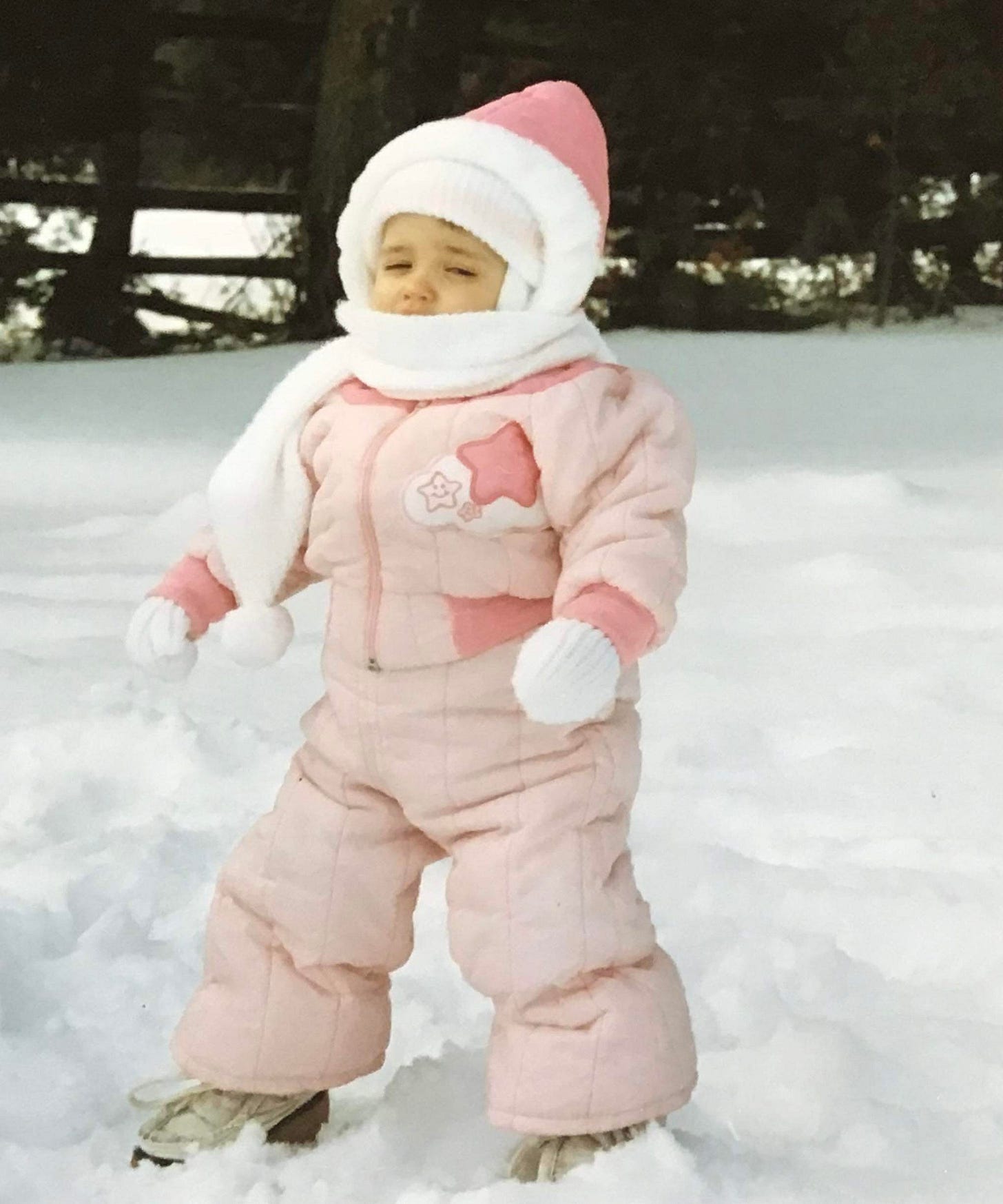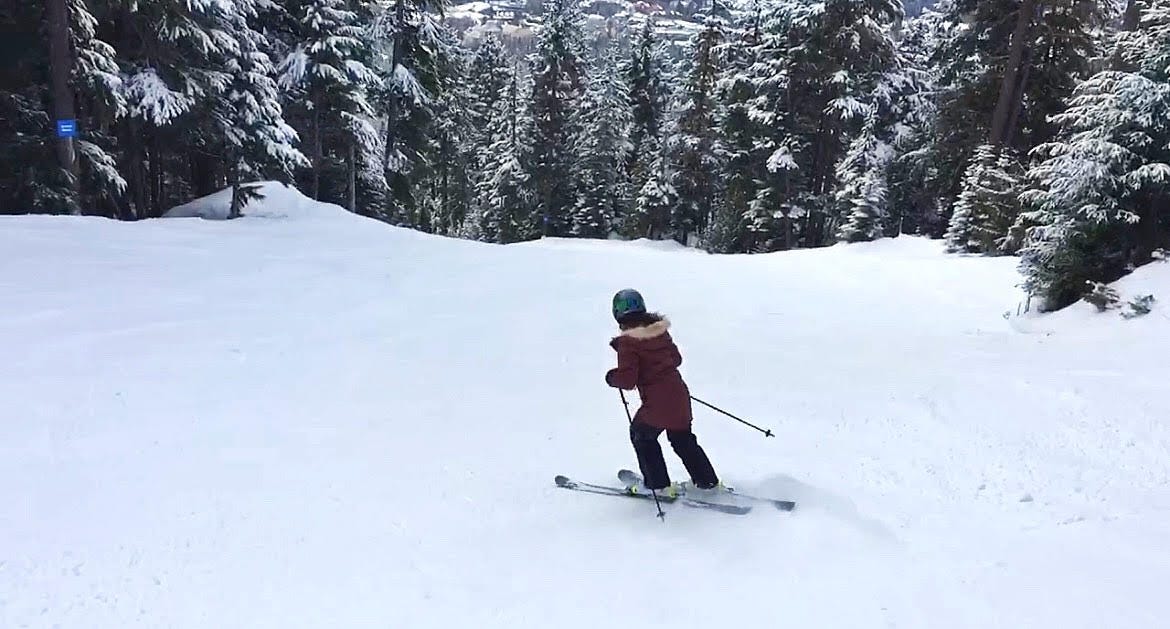It was a stunning snow-filled day in beautiful British Columbia. We just got dumped with a fair share of powder the day prior, so the conditions were great for skiing, something I hadn’t done in a while. My partner and I got up early and hit the road for a short drive from our mountain home to the ski field, coffee in his hand, matcha in mine. It was lightly snowing, flakes slowly falling from the sky, almost in slow motion - a perfect ambiance for a day on the slopes together.
As we neared the ski mountain the snowcapped peaks grew bigger, and so did my fond childhood memories of skiing with my family. I was fortunate to have parents who loved giving us varied experiences throughout our upbringing - skiing, road trips, plenty of sports teams, creative arts, music, cottage weekends, and big family trips. I learned how to ski by the time I was out of diapers and wanted to quickly follow behind my older brother's tracts, mine in the beginner pizza shape to start though.
Anyone who grew up with a generous winter season knows the layers upon layers we had to wear to survive the negative temperatures but still enjoy a day out in the snow. A base layer, leggings and shirt over the top, then the thick snow gear - pants, jacket, mitts, toque and scarf. I thought about how my parents managed four children under the age of 10 and all that gear - that is an event all on its own before you even arrive at the ski field, gold medal in preparing children for skiing well earned.

The slopes were packed as it was a perfect powder day and locals were taking advantage of such pristine conditions. We did a few runs together, my partner snowboarding and me sticking to my long-loved and familiar skis - I did try snowboarding once and did fairly well, but the day ended with me walking down the mountain, board in hand, so I stuck to what I knew this time.
My feet were beginning to ache, so I made my way down to the chalet to switch my boots for a bigger size to allow for more comfort the remainder of our ski day. I made my way to the lineup, which was huge given the crowds, and waited patiently. Ahead of me, I noticed a father and his young son in line who must have been waiting at least thirty minutes at this point, but they were starting to finally approach the front and get helped. Just as the person directly in front of them was wrapping up, the father started to make his way closer knowing they were about to be seen next in line and then they could get on with their ski day. Then, his son suddenly said, “Dad I need to go to the bathroom.” The father looked down at his son with kind eyes and without a moment of hesitation gently said, “Okay let’s go to the bathroom”, and off they went leaving their place in line just as they were about to be served after such a long wait.
I stood there in awe of this father’s immediate response to his son's needs - without frustration, without criticism, and without any attempts to alter or shut down those needs in the name of convenience - he simply listened and responded with love and care. We all can relate to the frustration of waiting in long lineups and having our patience tested, it’s not a good time for anyone. I don’t know what this father was thinking or feeling at the time, and it doesn’t matter. Maybe he felt an impulse to react or maybe he wanted to ask his son to wait, but in that moment I witnessed this father choose attunement over convenience. And the message that sends to this child is that his needs matter, he’s cared for, and he’s safe to express himself.
Attunement is the foundation on which we build our relationships, and without it, authentic connection evades us. To put it simply, attunement is having the ability, and capacity, to be present with another person's expression or experience. When we attune with another, we come to resonate with their internal landscape, and this fosters a sense of closeness. Attunement asks that we meet another in their experience, it asks that we remain tethered to our regulation, and it asks that we lead with our hearts' intention over our minds' interpretation. And, this isn’t always easy to do, in fact, it’s sometimes harder to attune than it is to react, disconnect, or shut down - all parts of our nervous system that tries to protect us at all costs.
Our ability to attune with others is a direct reflection of the regulation within our own nervous system. When we regulate, we can relate - healthfully. But when we live in a world that perpetuates dysregulation at all angles - tv’s, phones, work demands, financial strain, lack of support systems, and limited resources - it’s easy to see why attunement comes last in a long list of to-dos.
So, what do we do then? We can look for the many micro-moments throughout our day in which there are opportunities for attunement because they always exist. They happen when we lean down to face a child and truly listen to their story about a bunny lost in a forest, they happen when our friend says “I’m fine” but we know they aren’t, so we ask more questions, and they happen when our partner comes home from work, and we sense they aren’t okay so we check-in.
No matter how old we are, we all yearn to be seen, heard, and known. Attunement doesn’t end when we become adults. Children require attunement from their adult caregivers to develop and feel secure, and adults require attunement to feel connected. All of our relationships require attunement to not only survive the friction and tension of difficult life chapters but to deepen intimacy, closeness, and safety.
But the truth is, it isn’t always convenient for us to attune with one another, and that’s kind of the point. It’s not convenient for a mother to be woken up multiple times in the night by her crying baby. It’s not convenient when your friend is feeling anxious and needs to leave the party earlier than expected. And it’s not convenient to take your child to the bathroom just as you are about to be helped after waiting in line for a long time. And that’s the point - to choose to meet another in their experience, even if it temporarily inconveniences us.
When we choose attunement over convenience, what we are choosing is connection - with self, with another, together. And that is how we face a world where pain and change is inevitable.
Write What’s Honest, Not What’s Trending: The Intersection of Authenticity, Attachment & Artistry
Listen to my podcast here .
Follow me on Instagram here .
The Writer’s Cabin, a free online creative co-working experience for writers to gather with intention and devote their heart to their craft. A space for you to meet yourself on the page, all parts of Self, without distraction and in service of devotion to the written word. A soft place to land to meet your art and be held in community with guided facilitation to support your writing practice.
The Writer’s Cabin is the place to abandon perfectionism and procrastination, and to welcome in devotion and intention. It’s hard, at times, to show up consistently and make space for art - especially while living in a fast paced, capitalist world that celebrates unhealthy productivity at the cost of our well-being. The Writer’s Cabin is a place to slow things down, connect with like-minded writers, and create from a place of regulation rather than activation.
I have not yet scheduled a date and time for the next Writer’s Cabin, so if you are interested and would love to join, I would love for you to comment below some suggestions for a day of the week and time that you’d prefer.
RECLAIM, a 12 week experiential and embodied journey for women. Focused on nervous system regulation, building healthier relationships, cultivating self-trust, and boundary setting. Click here to apply, enrollment opens soon.
Also, keep your eyes peeled for a brand new and very exciting event for creatives coming up!
As always, stay wild and go gently….
Laurita








I am so excited that you live in BC. I lived in Calgary for 25 years. And planning on going back soon.
What a remarkable response from that father, teaching is child so much in one brief moment. Attunement is so important and, at times, so tricky!